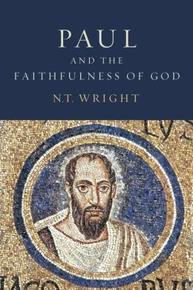One of my self-imposed projects over the January break is to read through N. T. WrightÔÇÖs (most recent) magnum opus, Paul and the Faithfulness of God. The work is actually two separate books (at 600 and 1200 pages, respectively!). Book I is primarily concerned with backgrounds, and PaulÔÇÖs worldview vis-├á-vis paganism and Judaism. Book II deals with PaulÔÇÖs theology and more directly engages the text of his letters.

I do not agree with everything Wright says, but I have probably learned more from Wright than anyone else, about how to read the NT in its historical context. I am nearly through Book I of Paul and the Faithfulness of God, and I have not been disappointed. WrightÔÇÖs encompassing grasp of the ancient world, and his prodigious understanding of the history of NT scholarship, allow him to tease out insights and connections that lesser minds (like my own) would never even stumble across.
Paul and the Faithfulness of God is Volume Four in a life-long scholarly project titled Christian Origins and the Question of God. Inevitably, those of us who have read WrightÔÇÖs earlier works will find ourselves in familiar (and often redundant) territory here. But there is much that is new, as well, particularly where Greco-Roman backgrounds are concerned. Indeed, the three chapters on (1) Hellenistic philosophy, (2) Greek and Roman religion, and (3) the Roman Empire are well worth the price of the book. They should be required reading for any serious student of the NT who already possesses a rudimentary understanding of Greek and Roman history.
The confines of a blog post allow me to highlight only a few of the valuable contributions Wright makes, as he sets the stage for his discussion of PaulÔÇÖs letters:
- A treatment of the Pharisees that rightly challenges Jacob NeusnerÔÇÖs apolitical understanding of the sect during the first century, emphasizing, instead, the kind of Maccabean zeal that led Saul, for example, to persecute the church, and which issued, finally, in the two Jewish revolts.
- An insightful overview of ancient philosophy (especially, Stoicism), which provocatively concludes that ÔÇ£[Paul] and his communities would have looked more like a new school of philosophy than a type of religionÔÇØ (page 203).
- A sound methodological discussion of how religion functioned in Roman antiquity, along with a thorough overview of the ubiquitous presence of the imperial cult in its various manifestations throughout the empire, during the first-century AD.
I found the chapter on Rome particularly helpful in view of the notion, championed by scholars in the UK (John Barclay) and in America (Denny Burk), that Paul nowhere has Rome on his radar screen as he pens his letters. Now, to be sure, Wright is too sharp a mind to get caught up in the PC trendiness of critical scholars on this side of the Atlantic, who see Paul challenging Roman imperialism at every turn, and who leverage the apostleÔÇÖs anti-Roman rhetoric prophetically to confront perceived imperial excesses of American public policy and practices. Wright properly insists upon the derivation of PaulÔÇÖs ideas from Judaism, and he does not seek to downplay texts like Romans 13, for example, where Paul offers his churches practical guidance for negotiating the realities of empire. Wright properly challenges us, however, to consider how PaulÔÇÖs letters would have been heard in a world controlled by Rome, and saturated with the literary, numismatic, epigraphic, and cultic output of the imperial propaganda machine. It is certainly the case that terms like ╬ÁߢÉ╬▒╬│╬│╬¡╬╗╬╣╬┐╬¢, ¤àß╝▒╬┐¤é ╬©╬Á╬┐ß┐ª, ¤â¤ë¤ä╬«¤ü, and ╬║¤ì¤ü╬╣╬┐¤é find their origins, for Paul, in the Old Testament. WrightÔÇÖs historical overview of Rome and the imperial cult only served to reinforce my conviction, however, that Paul knew exactly how this rich LXX vocabulary would resonate in a Roman setting. And this, in turn, suggests that Paul has Roman imperial ideology directly in his sights in numbers of passages in his epistles. Exactly what it was about Rome that Paul went after is open to debate. But that he did so, in my view, is not. Paul and Silas were, after all, accused of advocating ÔÇ£customs that are not lawful for us as Romans to accept or practiceÔÇØ (Acts 16:21). Wright helps us to understand why.
Perhaps most refreshing about WrightÔÇÖs work is his insistence that we read Scripture as ÔÇ£a continuous historical narrative with individuals finding their identity within itÔÇØ (page 115), rather than as a collection of ahistorical propositions about the salvation of the individual. With but a single qualificationÔÇöthe obligatory caveat about the danger of false dichotomiesÔÇöI could not agree more.
I rather doubt IÔÇÖll enjoy the second volume as much as I enjoyed the first, since I donÔÇÖt always follow WrightÔÇÖs lead in the nuts-and-bolts of Pauline exegesis. And Book I could probably have been written a bit more economically, perhaps 400, versus 600, pages. But I have found the first installment of Paul and the Faithfulness of God to be an encouraging and challenging bookÔÇöencouraging, because it reinforces so many of my convictions as a historian; challenging, because it opens many new avenues of reflection. So, yes, Wright On!
This is the first part of a two-part series. To read the second post, please see Part Two.
 ¢±╚ı║┌┴¤
¢±╚ı║┌┴¤
.jpg)

.jpg)
.jpg)